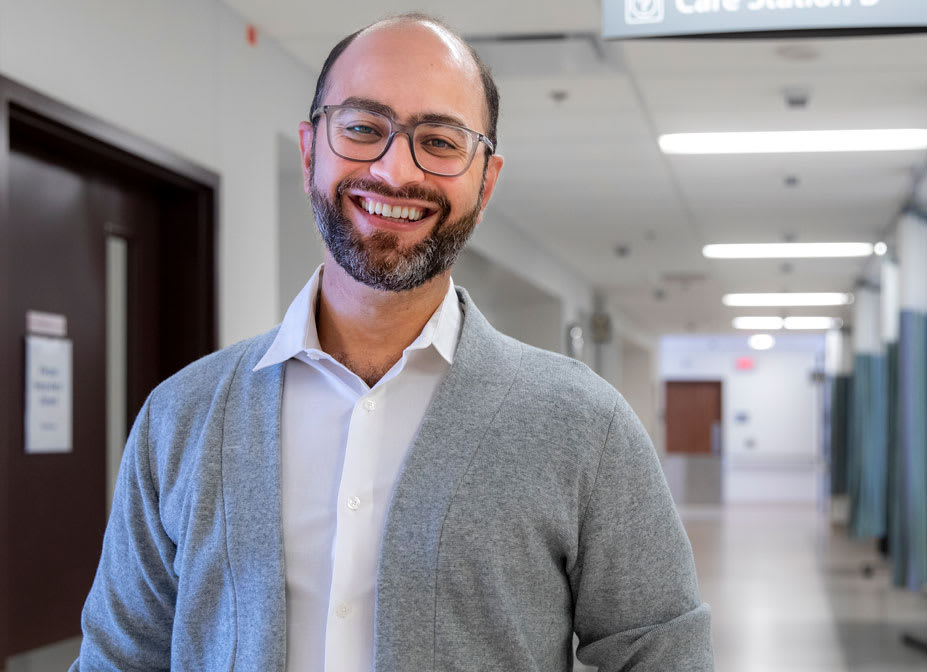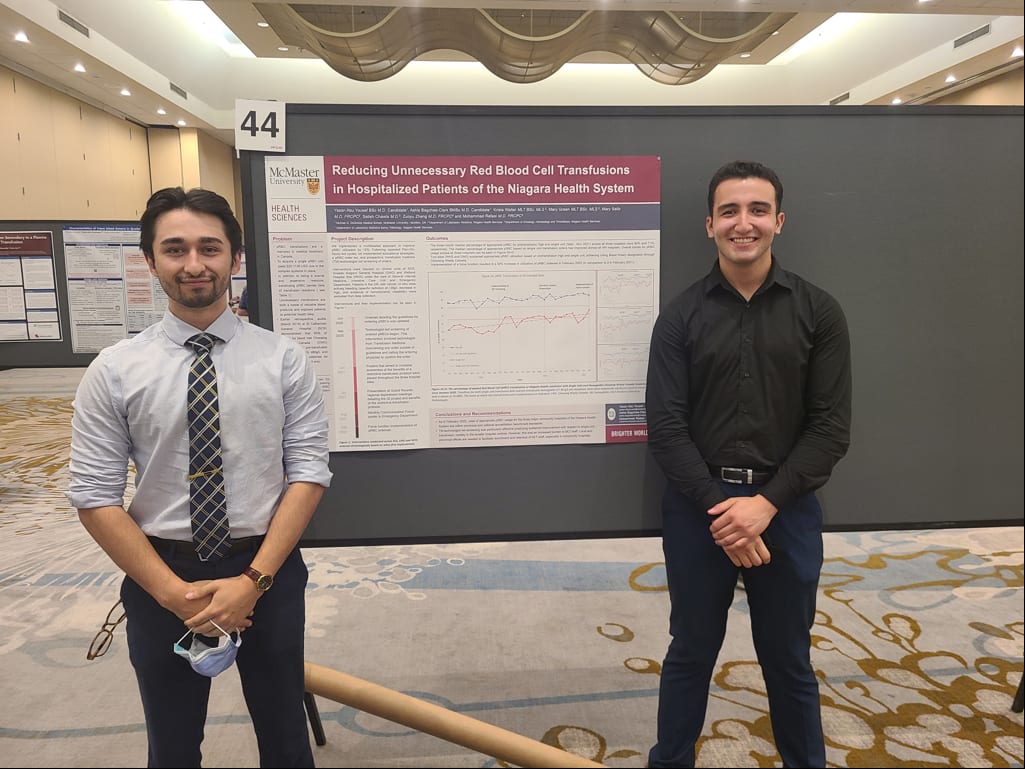We are Niagara Health is a series of stories that celebrates the incredible people working and volunteering in our organization and how they make a difference in the lives of patients and coworkers every day.

Dr. Mohammad Refaei is a benign hematologist whose work, as part of the Transfusion Medicine Committee, has seen both the Welland and Niagara Falls sites designated as Using Blood Wisely hospitals.
Sometimes less really is more.
That adage rang true time and again for Dr. Mohammad Refaei while studying to become a benign hematologist – especially when administering red blood cell transfusions and using blood resources judiciously.
He has continued putting that critical lesson into practice since joining Niagara Health in 2020 – as a newly graduated hematologist from the University of Alberta – using his own research and working with a clinical team to change the culture around red blood cell transfusions and how blood products are used.
Dr. Refaei’s work, as part of the Transfusion Medicine Committee, has seen both the Welland and Niagara Falls sites designated as Using Blood Wisely hospitals. The recognition is part of a national campaign by Choosing Wisely Canada and Canadian Blood Services that challenges hospitals to decrease unnecessary red blood cell transfusions. Using blood conservatively keeps supplies sustainable while also lowering the risk of side effects to patients.
Welland and Niagara Falls are two of 55 Canadian hospitals to earn the recognition. The St. Catharines Site is expected to be accredited in the near future.
Dr. Refaei is also the physician lead and co-chair of the Clinical Utilization Committee, which oversees the collaborative work of an inter-professional team to monitor, review, evaluate and make recommendations for using clinical resources across Niagara Health sites. Together, they use the latest evidence-based and patient-centered approach to meet the increasing demands on a complex healthcare system while using resources judiciously.
Dr. Refaei’s efforts have earned him the inaugural Physician Research Award, presented at Niagara Health’s second annual Research Day in May. The event highlights current healthcare research, community partnerships and collaborative ideas for research growth that will make a positive impact.
It’s the kind of recognition – and work – that really gets his blood flowing.
“I decided to take this on, but it’s a team effort,” says Dr. Refaei, who works at the St. Catharines Site. “I feel very privileged and supported by the organization. The most satisfying part of this quality improvement project was collaborating with stakeholders to reach a common goal. It’s very, very gratifying for me.”
Privileged is a word Dr. Refaei often uses to describe his career in medicine.
He took to the profession while growing up in Montreal and watching his mom, who has Type 2 diabetes, navigate the healthcare system. He was drawn to the compassion of his mother’s care team and saw himself being able to offer the same kindness and sensitivity to patients as their physician.
Being someone’s doctor is being invited into their lives and learning about their story, he explains.
“Medicine is a privilege,” Dr. Refaei says. “Patients tell us everything – their medical histories, their lives. They entrust us with their secrets and what ails them. I continue to learn from my patients’ stories, which helps me grow as a physician and person.”
He chose hematology because of its diverse applications and its active and advancing research, which he was exposed to and carried out during his internal medicine and hematology residencies at U of A. He credits his academic mentors, who emphasized the science of using blood wisely and its benefits to patients, for instilling him with the passion to do quality improvement projects related to blood resources elsewhere.
“Every practitioner that orders a blood product is a custodian of this scarce resource,” he says. “It’s important for us – it’s our job – to use blood products judiciously.”

Dr. Mohammad Refaei is instilling the same lessons that he learned in school in the McMaster University medical students doing their clinical placements at Niagara Health. McMaster medical students Ashis Bagchee-Clark (left) and Yazan Abuyousef are seen here with their poster presentation about reducing unnecessary red blood cell transfusions at the Canadian Society for Transfusion Medicine Conference held in Toronto in May.
When Dr. Refaei arrived at Niagara Health, he joined the Transfusion Medicine Committee, eager to help the organization reach provincial and national benchmarks for using blood products.
With a proposed target in mind to meet the Using Blood Wisely campaign criteria, Dr. Refaei focused his award-winning quality improvement project on changing minds about when red blood cell transfusions are necessary and how much blood to administer through in-person presentations, training modules and poster campaigns at the St. Catharines, Welland and Niagara Falls sites.
He encouraged physicians doing transfusions to start with a single unit of red blood cells, then reassess the patient to determine if more blood is needed. Dr. Refaei and the team alongside him also made the process of ordering blood more succinct and user-friendly.
The most important change to help Dr. Refaei and his team achieve their goal was enabling transfusion medicine technologists to audit clinician orders for prospective red blood cell transfusions.
It’s been two years of hard work but Dr. Refaei and those who supported him are seeing the results in the Using Blood Wisely designations and monthly internal audits to ensure Niagara Health continues meeting targets.
Now Dr. Refaei is mentoring other hospitals to use blood judiciously.
He’s also ensuring such quality improvements continue elsewhere by instilling the same lessons that he learned in school in the McMaster University medical students doing their clinical placements at Niagara Health.
“The collaboration between the medical school and Niagara Health is invaluable to the students but also staff,” Dr. Refaei says. “It keeps us true to the reasons we pursued medicine in the first place, which is to optimize care of patients. That wouldn’t happen if we didn’t start early with educating future generations of doctors.”

